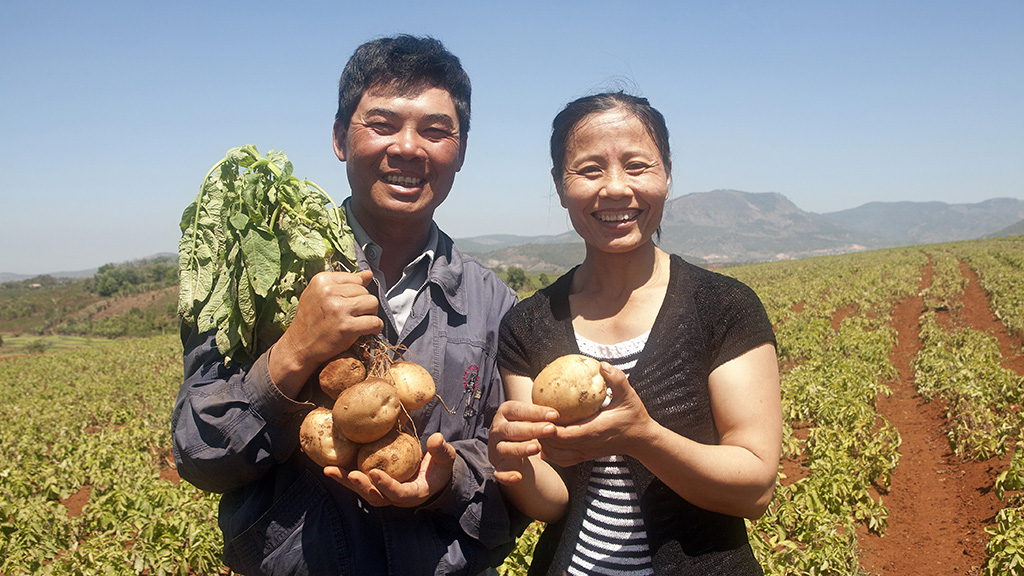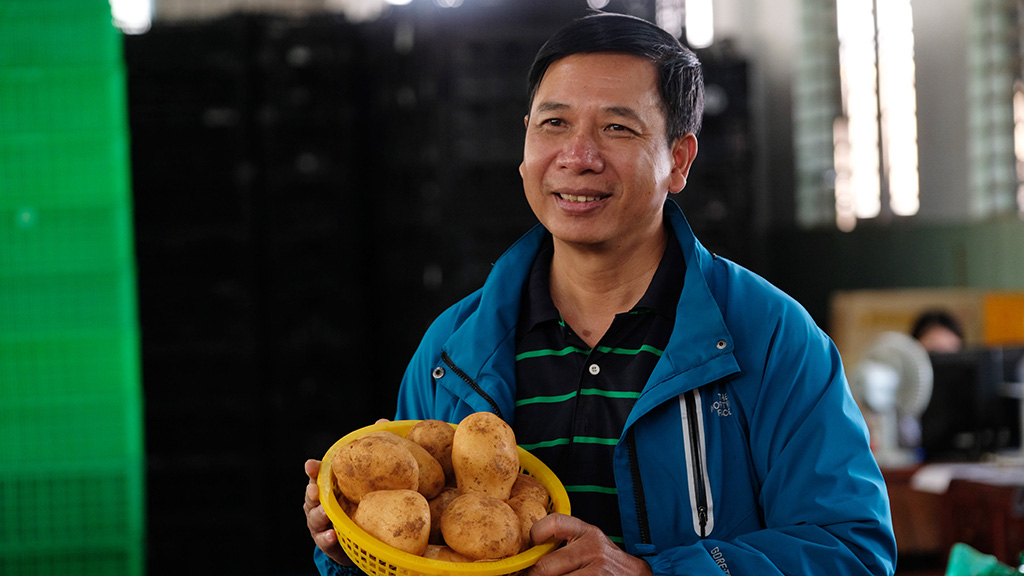A man in Lam Dong Province in the Central Highlands region of Vietnam has worked hard over the past decade to create a network of farmers with enough power to protect their own profits against large supermarket chains.
Over the past decade, Nguyen Ngoc Tuan, chairman the of Duc Trong District Farmers Association, has gained popularity in his district thanks to his work in developing a support network for 500 local potato growers to collaborate in order to ease overproduction and improve the quality and value of their crops.
Duc Trong District, approximately 30 kilometers from the provincial capital city of Da Lat, boasts the region’s largest potato farming hub.
But the success of the district’s farmers has not stopped them from encountering the same issue plaguing farmers throughout Vietnam’s rural localities: overproduction.
Since at least 2010, growers throughout Lam Dong’s agricultural districts have been dumping massive amounts of potatoes between October and April in order to prepare their land for planting other crops.
Despite the relatively high value of potatoes in the local market, the costs of a proper harvest far outweigh the profits.
“Supermarket chains have wholesale commitments and minimum quality benchmarks in place,” Tuan explained.
“Despite slumps in market prices, stores are still required to sell produce at specific rates. This means that overproduction hurts farmers’ profits without affecting supermarket profits. The farmers bear all the risk,” he said.
With the district’s annual growing area spanning more than 20,000 hectares, a mere ten percent of the total yields of over 650,000 metric tons are guaranteed by contracts.
The remaining crops are optioned through deals made orally and backed by little more than a handshake.
The situation means traders are consistently able to buy low and sell high while farmers are left exposed to heavy losses once overproduction causes prices to collapse.
In his efforts to protect farmers, Tuan drafted an in-depth report detailing the situation and began work on an initiative that would create a network for the area’s farmers and standardize their production process in order to minimize overproduction and keep prices steady.
Giving power to the farmers
Tuan’s work, though overall a success, comes with a long list of setbacks.
When he first began enlisting farmers into the network, he was bombarded with negativity from opponents.
The most common critique was that prices in the network remained low despite the power they hoped working as a collective would entail.
Still, the majority of farmers were appreciative of attempts to stabilize profits against fluctuating market prices.
“Farmers remained the most overlooked group in the supply chain despite having the most critical role. If thousands of farmers team up and form a thorough production plan, they can certainly secure a strong foothold in the market,” Tuan said.
Nguyen Manh Dat, a farmer from the district’s Phu Hoi Ward, admitted that he and other local farmers were anxious when Tuan first pitched them his plan but were quickly convinced when 40 households sold out their entire crop the following year.
Part of his success was working with farmers to market their products to potato chip producers and food processors.
In 2015, around 50 households in the area landed a contract with a large Korean food maker through the district’s Farmer Association.
Within a year, the initial 20 hectares of potato crops included in the original contract swelled to 50 hectares and, five years later, over 500 farming households now participate in the program.
“According to potato processors in Vietnam, the current factory capacity is operating at just 40 percent and they need to reach out to other countries to meet their needs. This means our farmers can produce more and still not worry about overproduction,” Tuan shared.
 |
| Farmers who take part in Nguyen Ngoc Tuan’s potato networking program to supply for processing plants are happy with their produce in Lam Dong Province in Vietnam’s Central Highlands. Photo: Mai Vinh / Tuoi Tre |
New varieties, new hopes
According to Tuan, the Atlantic potatoes, a staple in Lam Dong Province, are highly prone to phytophthora blight, a plant disease that damages the root, crown, and fruit in about 30 percent of potato crops.
“The damage is taking a toll on the farmers’ profits. Without a solution, the farmers will continue to sustain heavy losses and the network will give way,” he stressed.
In 2017, Tuan suggested to the Korean food maker that a phytophthora blight-resistant variety of potato be used in their production process.
Four months later, the province began producing Doobak potatoes. Not only are Doobak resistant to the disease, but they also produce 28 metric tons of potatoes per hectare, an increase of eight metric tons compared to Atlantic potatoes.
“The key to our success is sustaining farmer trust and ensuring long term benefits to farmers,” Tuan said, adding that fertilizer producers now allow farmers to pay for the purchases later, which helps cut costs.
Despite tremendous success in matching farmers with buyers, Tuan has never grown a potato for fear that owning his own farm might affect farmer profits.
He shared his plans to engage farmers from the K’Ho and Chu Ru minorities groups residing in the locality and neighboring district of Don Duong in another networking program to farm organic rice and vegetables on a 200-hectare plot, adding that he’s received a wholesale offer from a business which would also build a pre-processing plant in the production zone.
Like us on Facebook or follow us on Twitter to get the latest news about Vietnam!

















































